Search results for: “Luxemburg”
-
Aufruf zur Prozessbeobachtung im Strafverfahren in Luxemburg am 27.2.2018 gegen Aktivist*innen des March for Freedom
Dienstag, 27. Februar um 15 Uhr, Appelationsgerichtshof Luxemburg, Gebäude des Obersten Gerichtshof, Plateu du Saint Esprit, Sitzungsraum CR.0.19 Fast vier Jahre nach dem europaweiten March for Freedom, welcher anlässlich der Europawahlen 2014 gegen die mörderischen Asyl- und Migrationspolitiken der EU organisiert wurde, sind immer noch 4 Aktivist*innen in Luxemburg-Stadt auf der Anklagebank. Während eines Aktionstags…
-
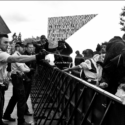
Fazit der Pressekonferenz zum Gerichtsprozess gegen Teilnehmer des March for Freedom in Luxemburg
Am 22.05.2017, fand die Pressekonferenz statt zum Gerichtsprozess gegen Teilnehmer des March for Freedom in Luxemburg. Vergangenen Donnerstag wurden vier Aktivisten aufgrund der Anklage wegen “bewaffneter und geplanter Rebellion” pauschal zu 6 Monaten Haft auf Bewährung, 1000,- EUR Strafe und insgesamt 4500,- EUR Entschädigungszahlung an die Polizei verurteilt. Drei der Aktivisten, gegen die…
-
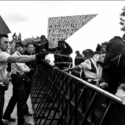
Pressekonferenz zum Strafprozess gegen AsylrechtsaktivistInnen in Luxemburg +++ press conference on criminal proceedings against activists in defence of asylum rights in Luxemburg
in english further below! Pressekonferenz zum Ergebnis der Gerichtsverhandlung: Montag, 10.04.2017, um 10 Uhr in Waldemarstraße 46, 10999 Berlin Pressekontakt: emal_g@hotmail.com 01575 373 0574 Sechs Aktivist*innen des March for Freedom zwei Jahre nach brutalem Polizeieinsatz bei friedlichem Protest in Luxemburg (Stadt) angeklagt Gerichtsverhandlung zu Vorwurf der “Rebellion” in Luxemburg am 5. und 6. April…
-
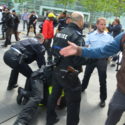
Solidarität mit den in Luxemburg Angeklagten, Freilassung aller politischen Gefangenen!
Gestern waren wir auf der Kundgebung für die Freilassung aller politischen Gefangenen! vor dem Gefängnis in der Turmstr. in Berlin. Wir waren dort wegen der Verhaftung von 11 Leuten in Luxemburg auf dem March for Freedom 2014. Auch ich bin damals verhaftet worden; auf dem Foto liege ich unter den Polizisten am Boden. Die Polizei…
-
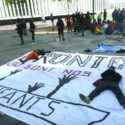
Prozess in Luxemburg – Repression gegen ‘March For Freedom”
english & french below 2 1/2 Jahre nach dem international organisierten March for Freedom sind 6 Aktvist_innen in Luxemburg-Stadt angeklagt. Während eines Aktionstags am 5.6.2014 war es in Luxemburg auf dem Kirchberg zu 13 brutalen Festnahmen während einer Demonstration gekommen. Anlass war eine Tagung der EU-Innenminister zum Thema „Kampf gegen illegale Immigration.“ Nun sind am…
-
Refugee Activists at the panel discussion at the XX. Rosa-Luxemburg-Conference, Berlin
“Politicians of the green party went to Lampedusa. Why are they going there? We are here!” Article:
-
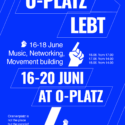
We are O-Platz! Our movement is present from 16-20 June at Oranienplatz
Oranienplatz has been a symbolic site for the refugee and migrant movement in Germany for more than 10 years now. The square has been the main site for ongoing protests, rallies and sit-ins, all aimed at drawing attention to the plight of people on the move seeking asylum in Germany. The significance of O-Platz for…
-
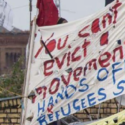
Network Conference: Solidarity Struggle During Corona Virus Time
On the 19-6 at 4pm in Mehringhöfe (Gneisenaustr 2a, 10961 Berlin) Blacks and whites together for human rights will conduct the conference about how was the struggle (each group’s struggle) during the Corona Virus and what was different in this time, how can we exchange the ideas to strengthen one another in our struggle on…
-
Internationale Online-Reihe: Kirchenasyl und das globale Migrationsregime
vom BAG Asyl in der Kirche Die englischsprachige Ankündigung finden Sie hier Am 25. Mai, 2. Juni, 24. Juni und 18. Juni 2021 um 19:00 CET (Berlin)/ 13 p.m. EST (New York) – in englischer Sprache mit Simultanübersetzung ins Deutsche. Die Teilnahme ist kostenlos, eine Anmeldung ist jedoch erforderlich unter: info@kirchenasyl.de Auch eine Teilnahme an einzelnen Veranstaltungen ist…
-
DEMO – Abolish all camps!
DEUTSCH UNTEN ++ FRANÇAIS CI-DESSOUS 13:30 Start of the bicycle demos15:00 Start of the rallies with two locations We are people with and without a history of migration in Brandenburg.We fight together against racism and deadly borders. On June 1, 2020 we will meet in Potsdam to say out loud: Abolish ALL camps:Apartments instead of…